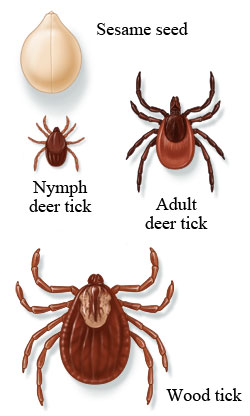
Overview
Ticks are small spiderlike animals. They bite to fasten themselves onto your skin and feed on your blood.
Ticks can carry diseases. But most ticks do not carry diseases, and most tick bites do not cause serious health problems.
Some people may have an allergic reaction to a tick bite. This reaction may be mild, with symptoms like itching and swelling. In rare cases, a severe allergic reaction may occur.
Most of the time, all you need to do for a tick bite is relieve any symptoms your child may have.
Follow-up care is a key part of your child's treatment and safety. Be sure to make and go to all appointments, and call your doctor if your child is having problems. It's also a good idea to know your child's test results and keep a list of the medicines your child takes.
How can you care for your child at home?
- Put ice or a cold pack on the bite for 10 to 20 minutes once an hour. Put a thin cloth between the ice and your child's skin.
- Try an over-the-counter medicine to relieve itching, redness, swelling, and pain. Be safe with medicines. Read and follow all instructions on the label.
- Ask your doctor if you can give your child an over-the-counter antihistamine.
- Use a spray of local anesthetic that contains benzocaine, such as Solarcaine. It may help relieve pain. If your child's skin reacts to the spray, stop using it.
- Put calamine lotion on the skin. It may help relieve itching.
To avoid tick bites
- Help your child avoid ticks:
- Learn where ticks are found in your community, and stay away from those areas if possible.
- Cover as much of your child's body as possible when your child plays in grassy or wooded areas.
- Use insect repellents, such as products containing DEET. If your child is older than 2 months, you can spray these repellents on your child's skin.
- Take steps to control ticks on your property if you live in an area where Lyme disease occurs. Clear leaves, brush, tall grasses, woodpiles, and stone fences from around your house and the edges of your yard or garden. This may help get rid of ticks.
- When your child comes in from outdoors, check your child's body for ticks, including the groin, head, and underarms. The ticks may be about the size of a sesame seed.
- If you find a tick, remove it quickly. Use tweezers to grasp the tick as close to its mouth (the part in your skin) as possible. Slowly pull the tick straight out—do not twist or yank—until its mouth releases from the skin. If part of the tick stays in the skin, leave it alone. It will likely come out on its own in a few days.
- Ticks can come into your house on clothing, outdoor gear, and pets. These ticks can fall off and attach to you and your child.
- Check your child's clothing and outdoor gear. Remove any ticks you find. Then put your child's clothing in a clothes dryer on high heat for about 4 minutes to kill any ticks that might remain.
- Check your pets for ticks after they have been outdoors.
When should you call for help?
Call 911 anytime you think your child may need emergency care. For example, call if:
- Your child has symptoms of a severe allergic reaction. These may include:
- Sudden raised, red areas (hives) all over the body.
- Swelling of the throat, mouth, lips, or tongue.
- Trouble breathing.
- Passing out (losing consciousness). Or your child may feel very lightheaded or suddenly feel weak, confused, or restless.
- Severe belly pain, nausea, vomiting, or diarrhea.
Call your doctor now or seek immediate medical care if:
- Your child has signs of infection, such as:
- Increased pain, swelling, warmth, or redness around the bite.
- Red streaks leading from the bite.
- Pus draining from the bite.
- A fever.
Watch closely for changes in your child's health, and be sure to contact your doctor if:
- Your child has belly pain, nausea, or vomiting.
- Your child gets a new rash.
- Your child has joint pain.
- Your child is very tired.
- Your child has flu-like symptoms.
- Your child has symptoms for more than 1 week.
Where can you learn more?
Go to http://www.healthwise.net/patientEd
Enter L845 in the search box to learn more about "Tick Bite in Children: Care Instructions".
Current as of: October 1, 2025
Author: Ignite Healthwise, LLC Staff
Clinical Review Board
All Ignite Healthwise, LLC education is reviewed by a team that includes physicians, nurses, advanced practitioners, registered dieticians, and other healthcare professionals.

